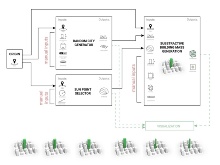Associative and Algorithmic Design
First Meeting: 22.10.2022, 9:45, Room 10.08
Computation profoundly impacts contemporary understandings of architectural form, space, and structure. It shifts the way one perceives form, the way in which form is used, and the way in which form is produced. Some of the broadly used terminologies related to how a design model is constructed are associative and algorithmic design. In the computational design discourse, associative design technique is a methodology that is based not on fixed metric quantities such as traditional design but instead, based on a consistent network of relationships between objects or geometry primitives: the assemblage of objects. In a similar way to that of associative design, developments in scripting have allowed for algorithmic design processes to advance. Algorithmic design is a system that uses sets of instructions to perform certain tasks, for example, to generate a digital model of a structure.
This seminar provides a foundational introduction of associative and algorithmic design for architectural design modeling in an open source visual modelling environment using Python. We will develop custom geometry computation from scratch as well as implementing available geometry kernels such as Rhinocommon (Please note: for this purpose, access to Rhino 7 is a must).
Students have the opportunity to enhance their knowledge about geometric modeling and algorithms both in regards to practically gaining the related scripting skills and theoretically understanding relevant aspects of form generation and related mathematical and computer science principles. Based on the investigation of the related mathematics and programming paradigm, relatively simple algorithms will be developed to produce complex systems within an architectural context.
The course will be taught in person including lectures, discussions, and hands-on tutorial sessions.
UPDATE
The acceptance to this course is based on selections. Please send your portfolio in a pdf file (max. 10 MB) to zuardin.akbar@icd.uni-stuttgart.de until 09.10.2022. Please use this naming format: aad22_firstname_lastname_matrikelnummer.pdf
The portfolio must show your competency in digital modelling from previous projects. Proficiency in Rhino and Grasshopper is preferred, previous programming experience in any language is a plus but not mandatory.
PLEASE NOTE! The accepted spots will be announced via email on 12.10.2022, registration to @Campus will only be possible after the acceptance to our course.


